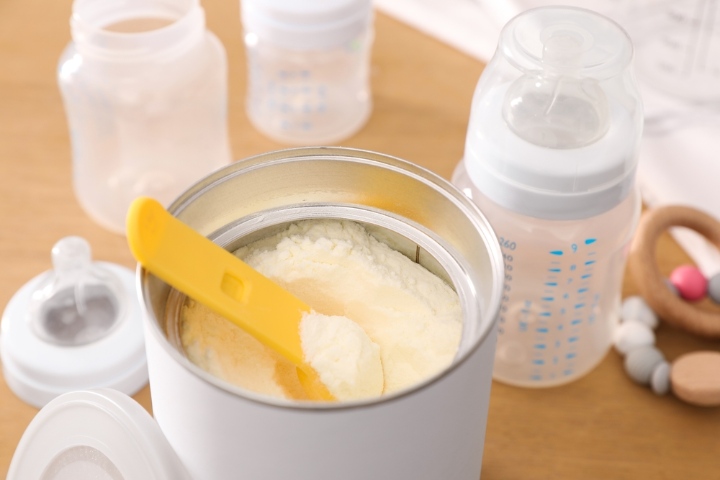All babies cry, and in most cases, the crying is subdued once the baby’s needs are addressed. However, there are moments when a baby cries for hours a day and does so often in a week, for many weeks. This is what is usually referred to as colic, but what is colic in babies?
Understanding colic can often help parents distinguish it from cries for essential needs such as feeding and changing the diaper. It may also help you learn ways that work the best to soothe your baby. Read this post to understand colic in babies and ways to manage it effectively.
What Is Colic And How Common Is It?
Colic is the uncontrollable and frequent cries of otherwise healthy babies. It is defined as crying for more than three hours a day for at least three days a week, with these episodes occurring for more than three weeks. According to StatPearls publishing in the National Library of Medicine, 20 percent of infants worldwide reported colic. Most infants are colicky during the first six weeks of their lives. These cries mostly occur in the late afternoon or early evening but may occur at other times of the day too. It rarely indicates any sickness or hunger. But it must be remembered that serious diseases like meningitisiXInflammation of the protective membranes and fluid that surround the brain and spinal cord. can also present with excessive crying in an infant. So careful observation and doctor’s opinion is necessary. Nearly one in every four babies experience colic, and it usually subsides within the third or fourth month (1).
What’s The Difference Between Colic And Normal Crying?
Normal and colic crying may seem similar, especially in newborns or for new parents. The notable difference is that normal crying is usually for a need, such as feeding, changing diapers, or cuddling. If the need is addressed, the baby calms down immediately. However, colic may continue even if the parent tries to address the need. Doctors also follow the rule of three; three hours of crying per day, at least three times a week, and for over three weeks is referred to as colic (2).
When Does Colic Start And End?
A baby might show a sudden onset of colic during the first three weeks of life. This fussiness may reach its extreme between the fourth and sixth weeks. It usually resolves on its own following the sixth week and subsides completely after the third or fourth month. Most babies seldom display colic after the age of six months (1).
What Are The Symptoms Of Colic?
Since colic is characterized by immense crying, there are chances for it to go unnoticed. The following symptoms may help you determine it better.
1. Signs that accompany crying: A baby with colic cries louder in a high-pitched voice. This inconsolable crying may be accompanied by curling up of legs suggesting abdominal pain or clenching their fists, implying discomfort and irritability(3).
2. Other signs: There are often a few other signs that mark colic in babies (4).
- Grimacing, reddening, or frowning of the face
- Rumbling sound from the tummy
- Tightening of the stomach
- Arching of the back
- Passing gas or stool during or immediately after crying (this may be due to swallowing the gas while crying). The baby might stop crying after the passage of stools.
- Refusal to eat or feed during colic
- Feels comfortable when held in an upright posture on the caregiver’s shoulder.
- Swollen abdomen
Changes in child temperament and sleep disturbances may also be noticed. A study has shown that children with colic had temperamental changes and slept for less than the recommended amount of time. The Infant Characteristics Questionnaire (ICQ) and The Emotionality, Activity, and Shyness Questionnaire (EAS) were used to score and assess these parameters. As the below graph depicts, colic has a small effect on a child’s temperament over time. The mothers of colicky children perceived children’s temperament as more challenging from the age of 6 months to 5 years, as indicated by the low temperamental score on the graph.
Representation of the associations between infant colic and child temperament over time
Source: Infant colic, young children’s temperament and sleep in a population based longitudinal cohort study; BMC Pediatrics
What Causes Colic?
The exact cause of colic is unknown, but there could be a few possible contributing factors (5).
- Acid reflux: Gastroesophageal reflux (GERD) is a condition in which the stomach contents move upwards through the esophagus (6). This can lead to gastrointestinal discomfort.
- Air ingestion: Babies tend to consume a lot of air through their mouths while consuming milk or crying. This air ingestion may cause discomfort, making them colicky.
- Allergies: It is believed that food allergies may cause colic in babies due to the uncomfortable symptoms they cause. For instance, a baby could be allergic to the cow’s milk protein present in the formula. In this case, the baby might cry a few hours after milk consumption (7). If an exclusively breastfed infant has cow milk protein allergy, dairy products in the mother’s diet can cause infantile colic.
- Lactose intoleranceiXA condition in which the body is unable to digest natural sugar called lactose, leading to digestive problems.
- Caregiver’s stress: A baby may sense the primary caregiver’s stress or depression and respond to it through uncontrolled crying.
- Maybe related to childhood migraine.
- Maternal smoking
How Is Colic Diagnosed?
There are no specific tests to diagnose colic other than studying the symptoms. You may be asked to brief the baby’s symptoms and medical history to the doctor. You may be asked about the crying episodes’ frequency, pitch, and timings. The baby’s dietary patterns and bowel movements would also be assessed (5). If GERD, allergies, or other infections are identified, the doctor may conduct additional tests if needed.
How Is Colic Treated?
Colic in babies subsides on its own within a few months. Although there is no treatment for colic, the following methods may help calm colicky babies (8).
- Dietary changes: If the colic is due to food allergies, it may help to change the diet. For bottle-fed infants, you may try switching to a different formula after doctor consultation. You may ask them about protein hydrolysate formulas as they are more easily digestible. If the infant is breastfed, the nursing mother could try a low-allergen diet. Note the changes in the baby if dietary modifications are effective.
- Probiotics: These are good bacteria that help maintain a healthy gut environment. The probiotic strain Lactobacillus reuteriiXA bacteria found in the gastrointestinal tract of humans which is used to treat bowel movements. could help reduce colic symptoms in a breastfed baby. Consult a pediatrician first before giving any type of probiotic to the baby.
A few over-the-counter medications are available that claim to treat colic. However, their efficacy and safety are not proven. Herbal supplements, such as gripe water, also fall under this category. Caution is advised against their intake without a doctor’s approval.
How To Soothe The Baby And Prevent Colic?
If the baby has colic, a few tricks may help calm them. Not all babies may respond to the same intervention. Therefore, do not hesitate to try various measures and see what works best to manage your baby’s colic.
- Hold your baby upright on your shoulder. You can pat their back.
- Play white noise or some soft music when they start to cry. Humming a song or singing to them might also work.
- Burp your baby after a meal and in between feeding. You may also try burping them once they start crying.
- Practice slow-feeding if your baby is bottle-fed. Place the baby in a straight or semi-inclined position to prevent them from ingesting excess air and milk, causing discomfort and colic. You may also switch to slow-feed bottle nipples.
- Give them a warm bath. This may calm them and may even put them to sleep.
- Swaddle them in a warm blanket and cuddle to calm them down.
- Take them on a stroll to distract them. Try taking them to a calm and peaceful place, such as a garden. You may also take them on a drive with them safely strapped to a baby seat.
- Place them in a rocking cradle and gently rock them back and forth. You may also place toys within their line of sight to distract them.
How Can Parents Cope With A Colicky Baby?
It is natural to feel overwhelmed after seeing your baby distressed. Here are a few tips to keep yourself calm and relaxed while managing the baby’s colic.
- Request your family members to take care of your baby from time to time. During this time, take a nap or engage in a relaxing activity of your choice. It may help to go out on a walk.
- Meditate to reset your mind and bring down the stress levels. It may help to read a few positive affirmations. Know that colic is a short-term event, and this period shall pass too.
- Be patient and do not blame yourself. Colic does not mean you are a bad parent. Give it some time, and the baby will grow out of it.
- Consult a health professional on any overwhelming thoughts. Express your grief freely and restrain from hiding any thoughts. Join support groups or interact with other mothers to know how they managed their babies’ colic.
When Should You Call A Doctor?
You must consult your baby’s doctor in the following scenarios (2).
- The baby has colic after four months of age.
- Colic is accompanied by fever, vomiting, bloody stools, or diarrhea.
- You notice the baby becoming extremely weak and lethargic after colic episodes.
- The baby’s cries sound unusual.
- The baby has trouble breathing during colic episodes.
- The baby passes hard stools or noisy watery stools with a lot of gas.
- The baby has not passed stool for a few days.
Colic in babies usually lasts for a few weeks. Most babies get over colic once they are about four months old. However, the phase may cause significant stress to the parents. Remember that this moment shall pass too for your baby and you. Until then, be patient with your baby and understand them. Do not hesitate to seek help from family members and a health professional if you find yourself overwhelmed with your baby’s colic at any point.
Key Pointers
- Colic could be defined as frequent and extended crying in a healthy infant.
- It is characterized by episodes of crying lasting more than three hours a day, at least three days a week, for over three weeks.
- Unlike typical crying, colic crying persists despite meeting the baby’s fundamental needs.
- Although colic in infants may improve by the age of three to four months, the exact cause is unknown.
- Factors such as acid reflux, air ingestion, and allergies may play a role in its occurrence.
- To soothe a colicky baby, techniques such as burping, trying a different formula, playing soft music, swaddling, and slow feeding may be helpful.
Colic in babies can be a challenging and stressful period for parents. In this informative video, learn about its causes, signs, symptoms, diagnosis, and treatment.















